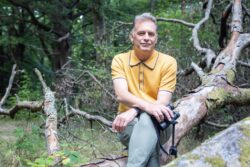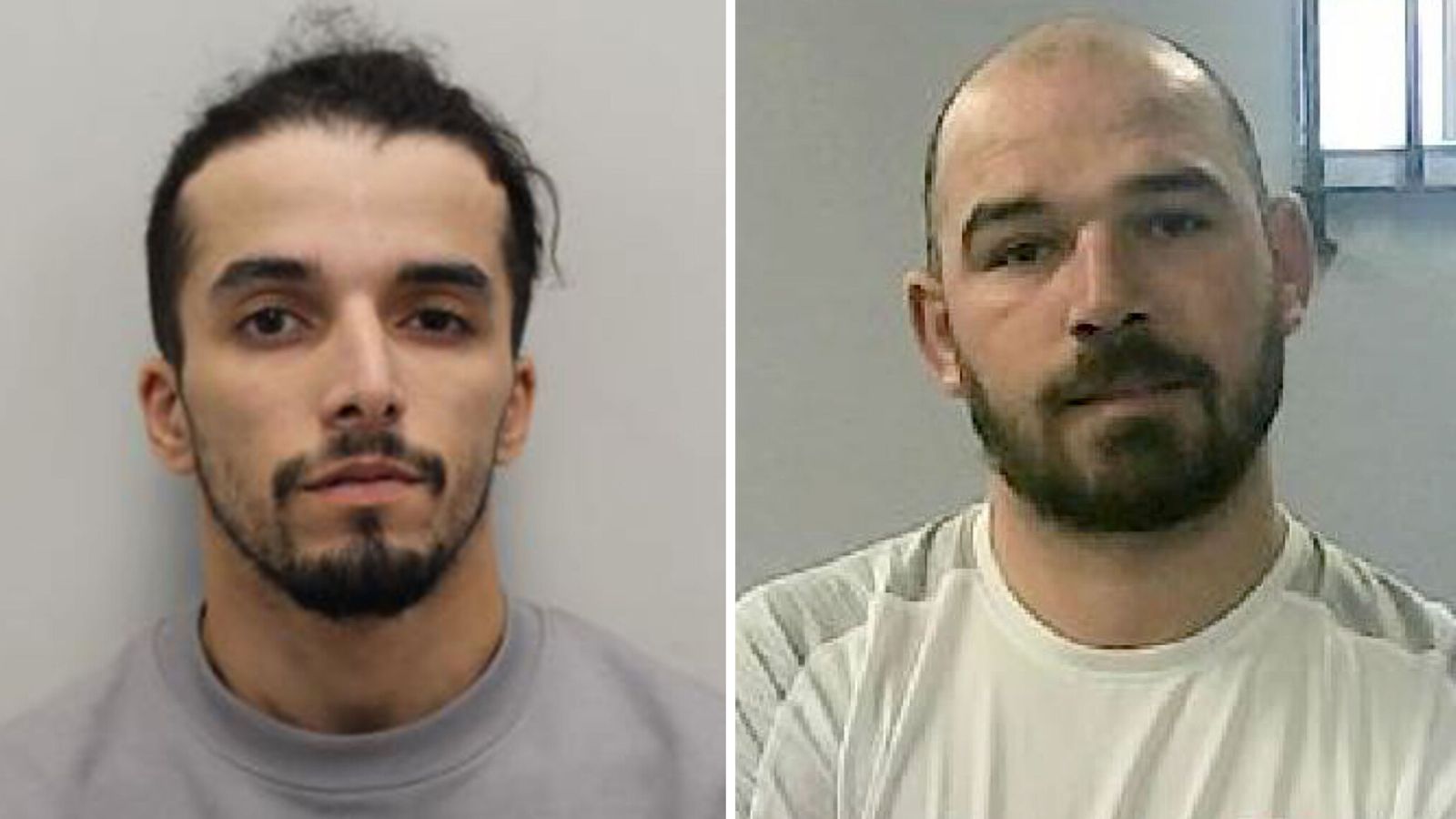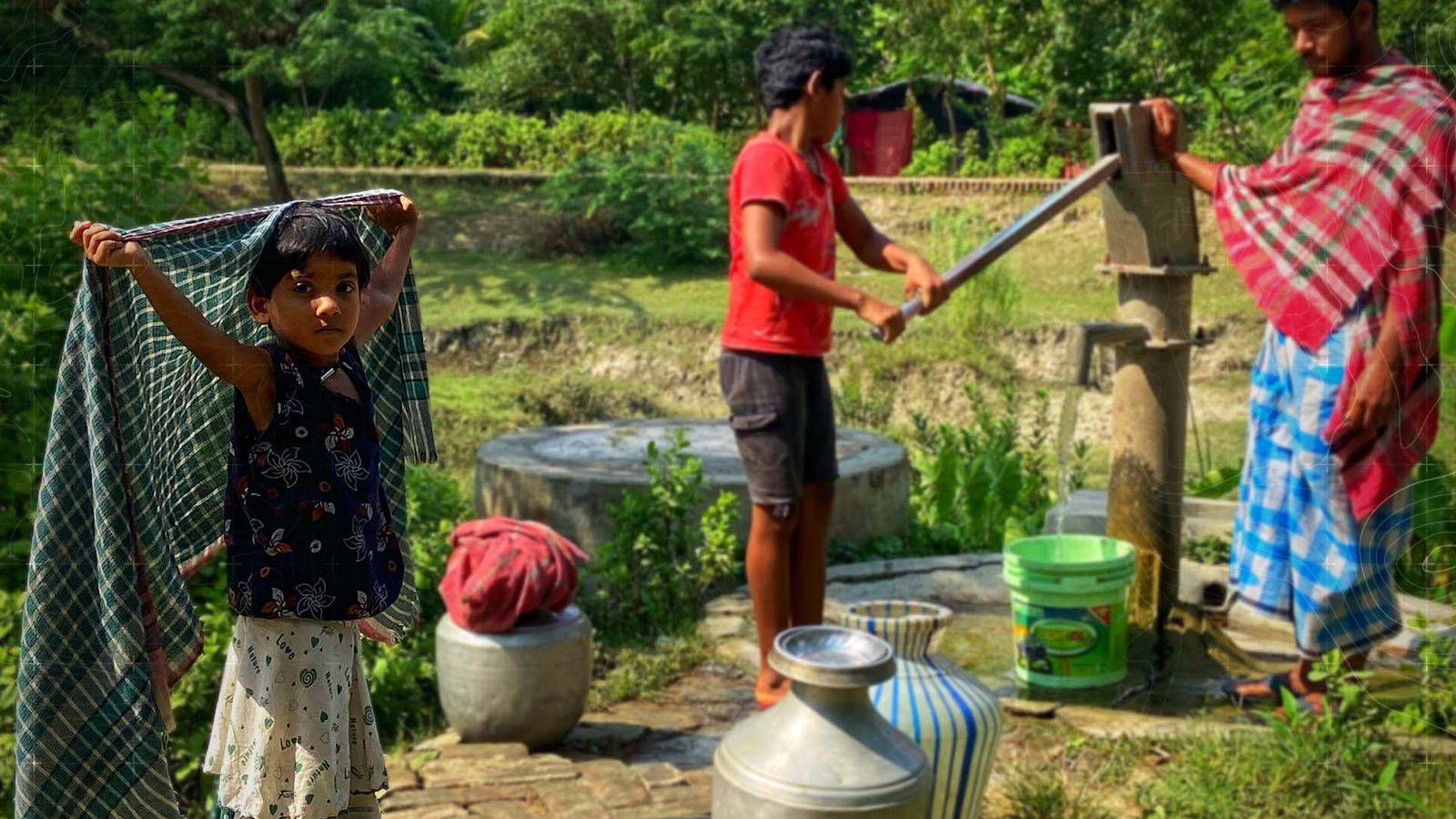Chris Packham says the government isn’t doing enough to protect nature (Picture: Sam Thomson)
Perhaps not everyone knows this, but TV presenter Chris Packham and designer Jenny Packham are brother and sister.
Given both have achieved considerable success in their respective fields (really wild success you might say), presumably there’s little cause for sibling rivalry, nor any vying for attention over Christmas dinner.
The same can’t be said for the focus of Chris’s latest campaign, the UN Biodiversity Conference – aka, ‘the other Cop’.
While Cop26 in Glasgow dominated headlines and Cop27 in Egypt boasted the attendance of US president Joe Biden, the fact that Cop15 has been postponed four times due to Covid and will now finally kick off in Montreal tomorrow has barely registered.
So low is its profile in fact, Rishi Sunak is not planning to attend.
The PM already has an awkward history with Cops, but to be fair this one has never been a big-name draw. Google ‘Cop14’ – the previous iteration held four years ago in Sharm El Sheikh, the same location as its big sister Cop27 last month – and most results are from the 2008 climate conference of the same name, not the conference tasked with halting an ongoing ecological crisis.
Rishi Sunak is not planning to attend Cop15 (Picture: Toby Melville/PA)
However, much has happened in the intervening years, developments that mean Mr Sunak’s attendance would make a strong statement regarding the UK’s commitment to reversing nature decline – which will in turn aid in mitigating many effects of the climate crisis.
Yet he looks a likely no-show, despite calls for him to attend from at least 40 MPs – and from Chris, whose latest campaign, in tandem with the RSPB and numerous other wildlife organisations, has focused on just that.
‘In the past it hasn’t been typical for world leaders to attend these types of Cop,’ says Chris, 61. ‘But this isn’t the past, it’s the present, and there’s a significant difference in the past and the present when it comes to biodiversity.
‘We have lost sixty-nine per cent of the world’s wildlife since 1970. The declines in our own backyard are even more significant in some parts of the country. Most of our principal habitats are in a poor state or in decline. Thirteen to fifteen per cent of the species that are monitored are in danger of disappearing completely.
‘For people of my age, many of those declines have happened in my lifetime, on my watch, which compels upon me a very real urgency to do something about it.’
To view this video please enable JavaScript, and consider upgrading to a web
browser that
supports HTML5
video
That 69% figure, revealed in this year’s WWF Living Planet Report, refers only to monitored species, and is a global average. In Central and South America, home of the Amazon rainforest, wildlife populations have declined by 94%. Freshwater species have dropped by 84% worldwide.
But Chris, whose long and varied CV in nature TV includes the Really Wild Show, Springwatch and Secrets Of Our Living Planet, is all too aware that it is government action, and systemic change, that is needed to fix the dual crises of nature degradation and climate change.
‘I’ve always been of the option that we have the great good fortune in the UK to have some semblance of a democracy, and that over the age of 18 citizens can vote to choose their elected representatives,’ he says.
‘But let’s be very clear. I don’t feel at this point in time that our government, our MPs, are representing our views in terms of the environment and biodiversity loss as forthrightly and urgently as they should be doing.’
Take Cop27. In the early days of his premiership Mr Sunak had not intended to join fellow world leaders in Egypt, instead opting to stay in No.10 and focus on the energy and cost of living crises – which, Chris highlights, are both related to the climate and nature crises. However, news that former PM Boris Johnson was jetting in, and growing discord from the public, led to the first u-turn of his time in office.
Boris Johnson at Cop27 last month (Picture: EPA)
With rumours of another BoJo cameo, will the prime minister acquiesce? And if not, what does that say?
‘If a leader of a western, relatively wealthy nation doesn’t attend something as significantly important as this, then we’re in deep, deep trouble,’ says Chris.
His campaign with the RSPB and others, Urgent Conversation, is pressing for Mr Sunak to not only attend the conference, but give due attention to the numerous pledges made at the upcoming Cop and by this Conservative government to halt and reverse biodiversity loss.
Be ‘nature positive’ says RSPB CEO
The Royal Society for the Protection of Birds was founded in 1889 following the amalgamation of two groups set up by women to discourage the fashion for feathers and exotic plumes on hats that was driving species to extinction.
Today the charity is still female-led, but has a much wider remit – including a key role in the Urgent Conversation campaign to protect all nature.
‘There are twin crises,’ says Beccy Speight, RSPB CEO. ‘The climate crisis, and the nature crisis. They are very intertwined – one of the bighest drivers of nature loss around the world is climate change, and we know that nature holds some of the answers to how we can both mitigate climate change and sequester more carbon, but also adapt to it as well.’
Raising awareness of nature loss has not been easy however.
RSPB CEO Beccy Speight (Picture: Sam Thomson)
‘Generally, in the minds of the public, climate has dominated, and I thnk that’s partly because there has been a net zero goal, this very simple way of talking about what we’ve got to do about climate change,’ says Becky. ‘So the challenge is how do we make sure the biodiversity crisis is given as much profile as climate because if we don’t fix both, we’re stuffed basically.
One of the ways is obviously to set a clear path forward, and we want that to be this phrase ‘nature positive’. It’s not a number like net zero, but it’s a way of summing up all the changes that need to happen around halting species extinctions and restoring nature. I think using that phrasing is really helpful.’
Beccy is also among those calling for the prime minister Rishi Sunak to attend this week’s Cop15 UN Biodiversity Conference.
‘What’s fundamental about this Cop15 meeting is that we’ve got to make sure it no only sets good goals for 2030 that prevent extinction and recover species populations and retain and restore habitat, but we’ve got to make sure that the finance and the ways of holding countries to account are in place as well, so that it really does get delivered.
‘We’ve got a million species at risk of extinction around the world, fifteen per cent of UK species are at risk of extinction, and we’re also seeing declines in almost half of our species.
‘The urgency is very, very real.’
‘It would be perhaps unfair to focus [only] on our current government, our current collection of MPs, because the rot has been in the system for a long time,’ says Chris. ‘We could go back through a course of several governments, if not many, to see that the activity has not been motivated with the right degree of urgency, commitment or investment at the right time – as is typical – and that means the current government is left picking up the pieces.
‘But when I don’t see them stopping to pick up those pieces and start to put things right, them I’m even more concerned because all they’re doing is kicking the ball down the road so it’s someone else’s problem.
‘It’s not our government’s problem [alone], it’s us, it’s our problem, it’s everyone who’s living and breathing on planet Earth’s problem.
Millions of people were left homeless in Pakistan after devastating flooding this year (Picture: Reuters)
‘But governments are victim of a desperate sense of short-termism, when we now have to make investments that are for decades, centuries and millennia ahead, because we’ve done so much damage to things that will take that long to heal and recover.
‘That requires bravery and commitment, which we’re not witnessing at this point in time.’
Well, not from the government he stresses, but just as Chris feels compelled to play his part, so too have activists across the country and the globe. From Skolstrejk för Klimatet (School Strike for Climate) started by Greta Thunberg, to Extinction Rebellion, Insulate Britain and, most recently, Just Stop Oil, citizens the world over are making their voices heard.
To view this video please enable JavaScript, and consider upgrading to a web
browser that
supports HTML5
video
The latter’s MO of blocking traffic, often by gluing themselves to roads, has proved divisive in recent months. Their aim is to compel the government to halt new fossil fuel licensing and production – something which continues apace following Vladimir Putin’s invasion of Ukraine, with 900 locations offered for exploration in October and up to 100 licences on offer.
‘If we’re in the position in any stage in the future to build statues, then we’ll be building statues to these people,’ says Chris when asked how he thinks history will treat them.
‘They’ll be seen as heroes, there’s no ambiguity about it whatsoever. We only have to look back through recent history to see people who are venerated for the efforts they’ve made to instigate change – Gandhi’s Salt March, the Civil Rights movement in America, the Suffragettes.
The March on Washington on August 28, 1963, where Martin Luther King Jr made his ‘I Have A Dream’ speech (Picture: Bettmann Archive/Getty Images)
A Suffragette demonstration in London, March 21, 1906 (Picture: Daily Mirror/Mirrorpix/Getty Images)
‘The Suffragettes were a lot more violent than Just Stop Oil. They used a lot of petrol bombs, they did actually attack quite a lot of people. Just Stop Oil aren’t attacking anyone, they’re a very peaceful organisation, and what antagonises me most is that people take an aggressive opposing view to their methods, rather than thinking about their motivation.
‘Why have they got up in the morning and essentially risked going to prison or receiving a fine that they’re never going to be able to afford. What motivates these people? Most of them are highly intelligent, well-informed individuals who are simply listening to the scientists – and they’re terrified. They’re frightened. I think fear motivates them more than anything, certainly the younger people.
‘Whatever you think of their methods, you should at least conjure some respect for the fact they’re trying to do something – you’re just sat in your car burning more fossil fuel. They’re trying to convey a message about that, that it is not a sustainable way to live any longer.’
Messaging, in all walks of life, is key. When awareness of humans’ influence on our planet’s atmosphere began to make headlines in the 1970s, it was more commonly referred to as global warming.
To view this video please enable JavaScript, and consider upgrading to a web
browser that
supports HTML5
video
This has gradually been replaced by climate change – not least due to George W Bush’s administration declaring it a ‘less frightening’ term than global warming. Ironic, then, that a study later found more Republicans showed concern for the environment when asked if they believed in climate change than global warming.
But politicians, activists, academics and journalists alike know that relentless missives about the end of life as we know it alone will not galvanise the masses. Creativity is needed to help with both messaging and motivation – and creativity is just what Chris and the RSPB have found.
Choreographer Sadeck Waff (Picture: Sam Thomson)
Sadeck and the students in action (Picture: Sam Thomson)
Working with choreographer Sadeck Waff, whose works include Shakira’s Girl Like Me and a performance at the Tokyo Paralympics closing ceremony, the Urgent Conversation campaign group have produced a ‘human murmuration’, mimicking the mesmerising natural phenomena of hundreds of thousands of starlings moving as one flowing, fluid black cloud across the evening sky.
‘We hope to capture people’s imaginations, so they recognise the beauty [of the dance], but also see the parallels between the way the performers have put the piece together and the natural world,’ says Chris.
‘The message is clear, and that is we need to murmurate as a species, we need to come together as a cohesive flock, we need to act as one positively to look after ourselves.
‘That’s the metaphor, and it’s pretty easy to read, I hope.’
Birds to watch for this winter – including during the weekly shop
RSPB CEO Beccy Speight shares her recommendations
I would definitely say go and see a starling murmuration because they’re happening between now and just after Christmas, so it’s a great time to see them in huge numbers gathering to roost at dusk.
Also look out for some of the birds than come over from Scandinavia for winter, like redwings and fieldfares. They’re in the thrush family, and often have quite a speckled chest.
A redwing takes flight (Picture: Getty Images/iStockphoto)
Red wings have this lovely red flash when they lift their wings and fieldfares have a particularly creamy chest, they’re both just gorgeous birds.
The other spectacular bird to look out for are waxwings. Again they come across from Scandinavia and they’re really charismatic, beautiful birds – very exotic looking. They particularly like the red berries of rowan trees, which you often find in supermarket car parks!
A waxwing (Picture: Getty Images)
Will it have the desired effect on the prime minister? At time of publication tickets to Montreal were only booked for Lord Goldsmith and Lord Benyon, with Mr Sunak’s passport tucked firmly away.
Chris and the RSPB will not be deterred however. Urgent Conversation was set up not just to encourage the PM to attend Cop15, but fully engage with the UK’s commitments to protecting the environment – not only for nature’s sake, but our own.
Wild habitats on land and sea act as huge carbon sinks. Healthy wetlands help protect against floods. Diverse forests are more resistant to fires and help clean both our air and water. There are myriad ways nature can combat both the cause and effects of climate change.
More: Trending
Pledges so far include halting biodiversity loss by 2030, protecting 30% of all land and sea for nature by 2030 – a key aim announced in the Johnson era that has made little progress – providing financing and resources to restore nature while empowering local people and indigenous communities, and holding countries accountable for their actions.
Sound familiar?
Like the many goals and targets set to combat climate change, halting and reversing biodiversity loss also requires multi-facted approach. And like those associated with the climate crisis, few are being met.
Twin crises, both of which have the potential to mitigate or exacerbate the other.
Sister conferences, one firmly in the other’s shadow.
But, Chris and the team hope, if Mr Sunak can be persuaded to put nature at the top table, it will move closer to getting the attention it deserves.
Learn more about the Urgent Conversation campaign here
MORE : Chris Packham shares his top tips for making sustainable changes at home
The naturalist is calling on Rishi Sunak to listen and prioritise nature.





